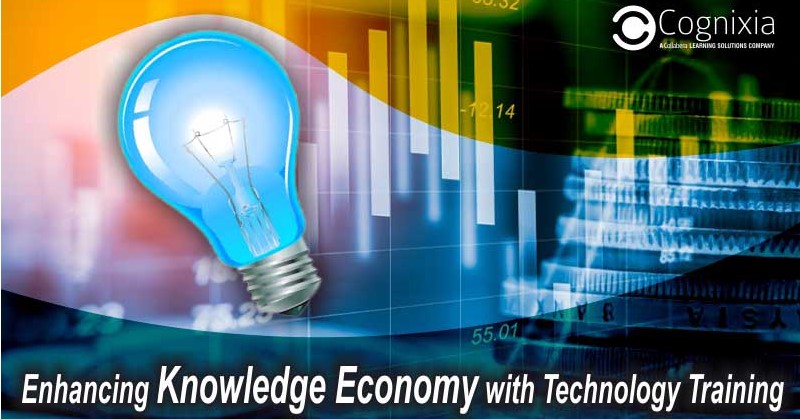Digital transformation has led to the rise of the knowledge economy. Over the years, economics has always been thought of in terms of finance. But the widespread innovation and disruption caused by the emerging technologies has led to the introduction of a new type of economy—the economy of the brain and its incredible power. Every individual possesses brainpower. The manner in which they spend and invest it is their own knowledge economy. When individual knowledge economies surmount the regional, national, or even the international boundaries, they comprise to form the global knowledge economy.

The rise of knowledge economy with technology
In a world driven by technological advancements, knowledge and education are the most important assets.
Knowledge economy is as old as mankind. The individual who rubbed stones to ignite fire shared their knowledge with others to create the knowledge economy of lighting up fire (with or without a marketing strategy, who knows!). People have, ever since, leveraged this knowledge over centuries to get their work done with ease. Today, a mere push of a button or switch ignites the fireplace to keep our homes warm.
Once the wheel was invented, nobody went back to re-invent it, but all the innovations took place thereafter to enhance the wheel and set it rolling without human effort with horse power, steam power and then later with diesel power. Amidst inventions and discoveries transforming the world, the economic structures kept changing from the Stone Age to the Information age.
The proliferation of technology has now changed the economic dynamics. Sharing information is now much easier and faster. And with the quick sharing and absorbing of knowledge, technology is increasingly becoming powerful. Technological advancement is directly proportional to complexity. If technology has to advance consistently, the pool of knowledge has to keep flourishing. This is the reason why developed countries are fueling their economy of knowledge and brainpower more than anything else.
Technology training in perspective with knowledge economy
If knowledge economy is a vehicle, then education is its driver.
But in the modern enterprise scenario, education cannot be restricted to colleges and universities, if businesses have to succeed. Corporate trainings and workforce learning and development are now an integral part of enterprise working. In the past, training and development department was the first to be eliminated in tough circumstances. Not anymore!
Emerging technologies like Internet of Things (IoT), Machine learning and AI, Deep Learning, Cloud Computing, Blockchain, DevOps, and many others have to be inculcated into workforce expertise if enterprises are to stay competitive.
What must enterprises do?
Knowledge is the new currency.
Enterprises must acquire, enhance and retain as much knowledge and brainpower as they can.
Acquiring brilliant minds to grow the pool of knowledge ensures success. Enterprises must hire brightest minds skilled in emerging technologies, and not shy away from investing in them. Since emerging technologies are mostly not a part of college and university curriculums, enterprises must tie up with professional e-learning and online training providers to fill up the technological expertise gap with certified professionals from these training providers.
Enhancing knowledge with corporate trainings, learning management systems (LMS), and knowledge sharing ensures that an enterprise not only hones the skill set of its workforce but also makes it future ready. Professionals who have their quiver of expertise reinforced consistently with cutting-edge technologies are more likely to stay and see themselves develop into elite professionals driving their organization’s success along with theirs.
Prioritizing intellectual capital over financial capital is the new business mantra, and successful enterprises are supporting it. Emphasizing upon intellectual capital in perspective with online learning and technology training creates a company culture where knowledge is shared quickly and easily.
Therefore, invest in the knowledge economy and reap a tremendous return that not only ensures success but also promises futuristic excellence.

